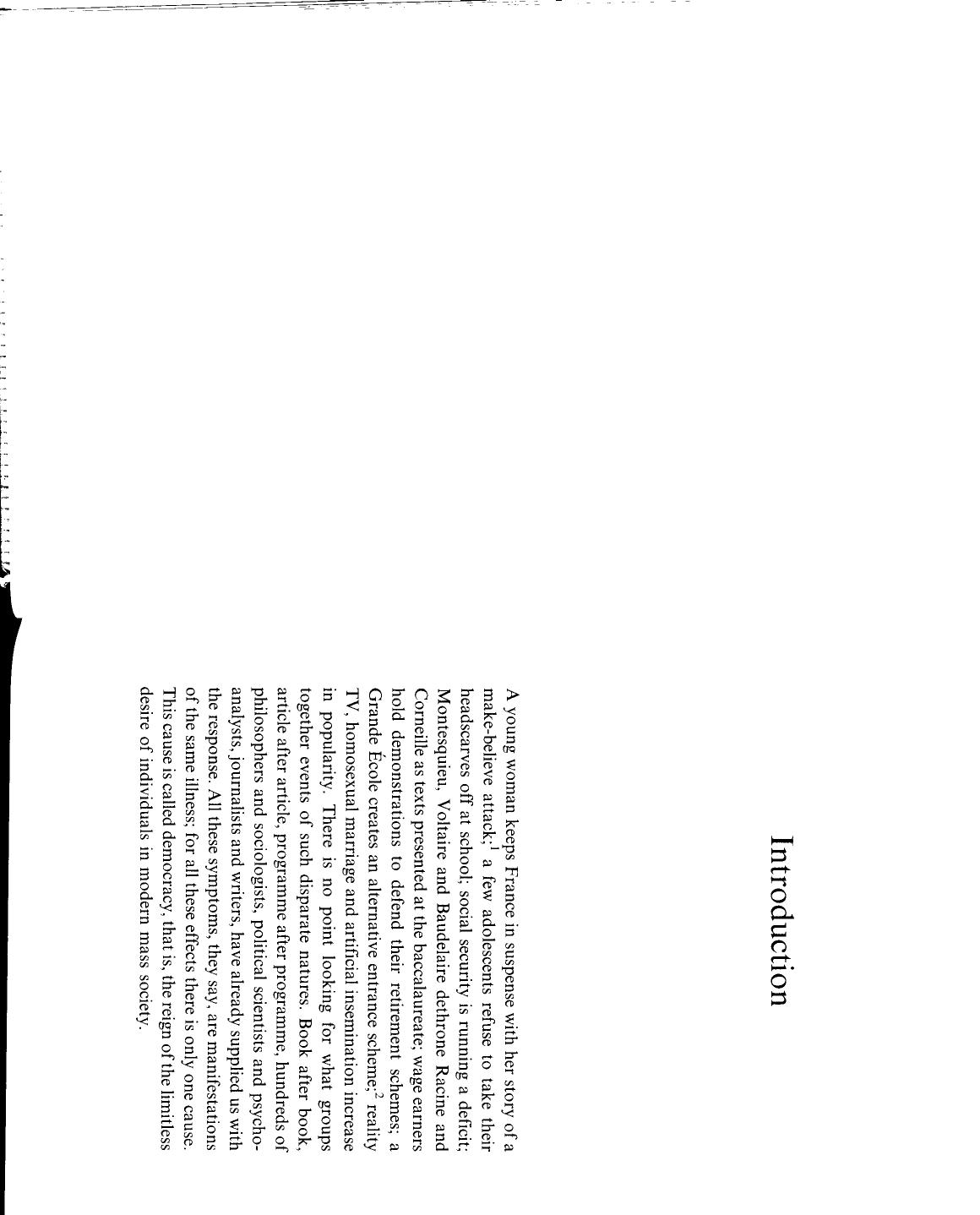Hatred of Democracy by Jacques Ranciere

Author:Jacques Ranciere
Language: eng
Format: epub, pdf
Publisher: Verso Books
Published: 2014-01-06T16:00:00+00:00
How the atomization of individuals can come to signify the triumph of number and force might remain obscure to the reader. But such is precisely the great subterfuge effected by recourse to the concept of ‘individualism’. That individualism is so out of favour with people who otherwise declare their profound disgust for collectivism and totalitarianism is an easily solved enigma. It is not the collectivity in general that is being defended by the denouncer of ‘democratic individualism’. It is a certain collectivity, the well-ordered collectivity of bodies, milieus and ‘atmospheres’ that adapts knowledges to rank under the wise direction of an elite. And it is not individualism as such that is being rejected but the idea that anyone at all can share in its prerogatives. The denunciation of ‘democratic individualism’ is simply the hatred of equality by which a dominant intelligentsia lets it be known that it is the elite entitled to rule over the blind herd.
It would be unjust to confound the republic of Jules Ferry with that of Alfred Fouillée. On the other hand, it is fair to say that the ‘republicans’ of our age are much closer to the second than to the first. Much more than inheritors of the Enlightenment tradition and the great dream of a scholarly and equal education of the people, they are inheritors of the great obsession with ‘disaffiliation’, with ‘disunion’ [déliaison], and with the disastrous mixing of conditions and sexes brought about by the collapse of traditional orders and bodies. It imports above all to understand the tension that inhabits the idea of the republic. The idea of the republic is one of a system of institutions, laws and moral values that eliminate democratic excess by making State and society homogeneous. The School, by means of which the State distributes the elements to educate simultaneously both men and citizens, quite naturally suggests itself as the best institution for realizing that idea. But there are no particular reasons why the distribution of knowledges – mathematics or Latin, philosophy or natural sciences – ought to educate citizens for the republic and not advisors to the prince or clerics in the service of God. The distribution of knowledges is only socially efficacious to the extent that it is also a (re)distribution of positions. To gauge the relation between the two distributions, one must therefore have an additional science. Ever since Plato this royal science has had a name. That name is political science. As it has been dreamt of from Plato to Jules Ferry, political science is what has to unify knowledges and, on the basis of that unity, define a common will and a common leadership for the State and for society. But this science will always be missing the very thing that is necessary for settling the excess constitutive of politics: the determination of the just proportion between inequality and equality. There are, to be sure, all kinds of institutional arrangements that enable States and governments to present oligarchs and democrats with the face that each of them want to see.
Download
This site does not store any files on its server. We only index and link to content provided by other sites. Please contact the content providers to delete copyright contents if any and email us, we'll remove relevant links or contents immediately.
| Anarchism | Communism & Socialism |
| Conservatism & Liberalism | Democracy |
| Fascism | Libertarianism |
| Nationalism | Radicalism |
| Utopian |
The Secret History by Donna Tartt(19017)
The Social Justice Warrior Handbook by Lisa De Pasquale(12182)
Thirteen Reasons Why by Jay Asher(8880)
This Is How You Lose Her by Junot Diaz(6868)
Weapons of Math Destruction by Cathy O'Neil(6259)
Zero to One by Peter Thiel(5778)
Beartown by Fredrik Backman(5726)
The Myth of the Strong Leader by Archie Brown(5491)
The Fire Next Time by James Baldwin(5421)
How Democracies Die by Steven Levitsky & Daniel Ziblatt(5207)
Promise Me, Dad by Joe Biden(5139)
Stone's Rules by Roger Stone(5073)
A Higher Loyalty: Truth, Lies, and Leadership by James Comey(4944)
100 Deadly Skills by Clint Emerson(4909)
Rise and Kill First by Ronen Bergman(4768)
Secrecy World by Jake Bernstein(4735)
The David Icke Guide to the Global Conspiracy (and how to end it) by David Icke(4694)
The Farm by Tom Rob Smith(4498)
The Doomsday Machine by Daniel Ellsberg(4479)
